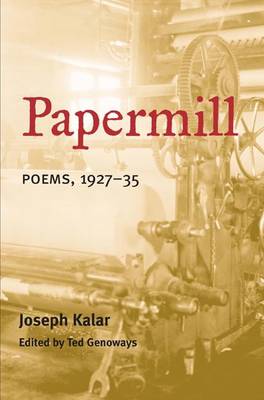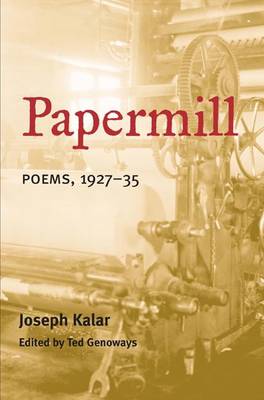
- Retrait gratuit dans votre magasin Club
- 7.000.000 titres dans notre catalogue
- Payer en toute sécurité
- Toujours un magasin près de chez vous
- Retrait gratuit dans votre magasin Club
- 7.000.000 titres dans notre catalogue
- Payer en toute sécurité
- Toujours un magasin près de chez vous
18,45 €
+ 36 points
Description
Unlike many of the protest poets of the Depression era, Joseph Kalar lived the workingman's life he wrote about. Though he produced some of the finest social protest writing of his era, the circumstances of Kalar's life--his tireless work in the unions, his long hours at the mill--meant that he wrote only occasionally and never published a book. Papermill is Kalar's most famous poem, a stark description of a shut-down factory. First published in 1931, the poem was praised by Max Eastman as "the rarest jewel so far produced by the ferment in America called proletarian poetry--and it is pure art." Stink from papermill, sulfer dioxide,
burns the nose and wreathes the mind
with thoughts of beaters to be filled
pumping jordans, swish swish of hot rolls,
paper to be made, the crash of spruce,
furred brances stabbing here and there,
the arm caught pulpy in the rolls,
the finger, lost . . .
burns the nose and wreathes the mind
with thoughts of beaters to be filled
pumping jordans, swish swish of hot rolls,
paper to be made, the crash of spruce,
furred brances stabbing here and there,
the arm caught pulpy in the rolls,
the finger, lost . . .
Spécifications
Parties prenantes
- Auteur(s) :
- Editeur:
Contenu
- Nombre de pages :
- 88
- Langue:
- Anglais
- Collection :
Caractéristiques
- EAN:
- 9780252072000
- Date de parution :
- 30-11-06
- Format:
- Livre broché
- Format numérique:
- Trade paperback (VS)
- Dimensions :
- 145 mm x 213 mm
- Poids :
- 131 g







